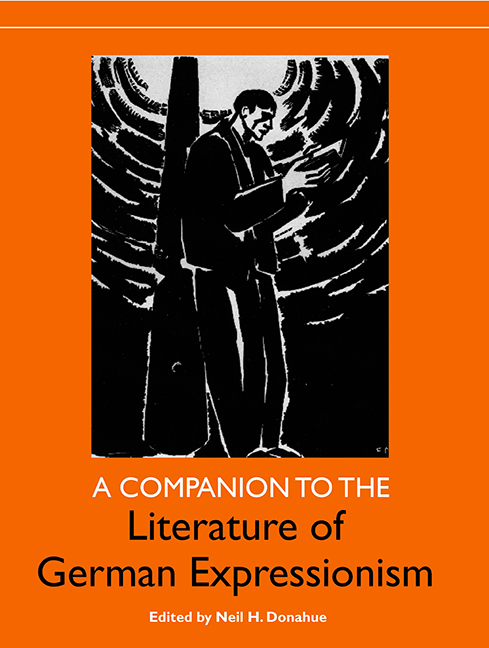Book contents
- Frontmatter
- Contents
- List of Illustrations
- Preface and Acknowledgments
- Chronology
- Introduction
- Philosophical Background
- Prose
- Poetry
- 5 Menschheitsdämmerung: The Aging of a Canon
- 6 Choric Consciousness in Expressionist Poetry: Ernst Stadler, Else Lasker-Schüler, Georg Heym, Georg Trakl, Gottfried Benn
- 7 Performing the Poem: Rituals of Activism in Expressionist Poetry
- Drama
- Interdisciplinary
- Select Bibliography
- Notes on the Contributors
- Index
6 - Choric Consciousness in Expressionist Poetry: Ernst Stadler, Else Lasker-Schüler, Georg Heym, Georg Trakl, Gottfried Benn
from Poetry
Published online by Cambridge University Press: 28 April 2017
- Frontmatter
- Contents
- List of Illustrations
- Preface and Acknowledgments
- Chronology
- Introduction
- Philosophical Background
- Prose
- Poetry
- 5 Menschheitsdämmerung: The Aging of a Canon
- 6 Choric Consciousness in Expressionist Poetry: Ernst Stadler, Else Lasker-Schüler, Georg Heym, Georg Trakl, Gottfried Benn
- 7 Performing the Poem: Rituals of Activism in Expressionist Poetry
- Drama
- Interdisciplinary
- Select Bibliography
- Notes on the Contributors
- Index
Summary
Michel Foucault concludesThe Order of Things (1966) with the suggestion that man, as the revolutionary/organic carrier of historical modernity, could dissolve into the sea of time, “be erased, like a face drawn in sand at the edge of the sea” (387). The major Expressionist poets experienced this moment in advance, as a premonition of an apocalyptic event far transcending the decay of the bourgeois ethos as depicted in Thomas Mann's broadly naturalistic Buddenbrooks (1901). Nineteenth-century epistemology had fused the categories of the Enlightenment into seemingly irrefutable coherence. The individual self claimed moral and emotional autonomy; the social and natural sciences appeared to guarantee historical progress; even the ideology of imperial expansion could be justified by an appeal to democratic civilization. The interlocking quality of these assumptions meant that there was no outside, no language of critique available other than that of the “self”-centered universe. Indeed, a powerful trend within modernism sought to radicalize the language of enlightened progressivism, transforming its temporality into sheer intensity (Futurism) and its self-centeredness into a world drenched in subjective emotional energy. For Theodor Däubler, writing in 1916 in Die neue Rundschau, the new temporality is “Simultanität”; the new sense of space requires objects to be “ichbegabt” (endowed with self), indeed “Der Mittelpunkt der Welt ist in jedem Ich” (The center of the world is in every self; Däubler, 51–53). However, such a program perpetuates, problematically, a discourse of agency, claiming the potential to reform or revolutionize the world one more time. But Expressionist poets knew an underlying truth: that the situation entailed a collapse of inherited perceptual categories, and that it was their task to give voice to this imminent event.
In his 1999 book Poetisches Pathos, Peter Stücheli argues for the grounding of the Expressionist moment in Nietzsche's category of pathos, “Anschauung und Entzücken zugleich” (contemplation and ecstasy at the same time; 79). While Nietzsche's role as Expressionist inspiration is well known, the norm has been to stress his later “Lebensphilosophie” (vitalism), as in the study by Günter Martens. Stücheli returns to the primal antitheses of Die Geburt der Tragödie (The Birth of Tragedy), “Individuation und Vernichtung” (individuation and destruction), “Sprache und Musik” (language and music; 80), insisting that “Begreifen des Pathos” (grasping/comprehending pathos) is only imaginable as “Ergriffenwerden dadurch” (being grasped/gripped by it; 84).
- Type
- Chapter
- Information
- A Companion to the Literature of German Expressionism , pp. 157 - 184Publisher: Boydell & BrewerPrint publication year: 2005



